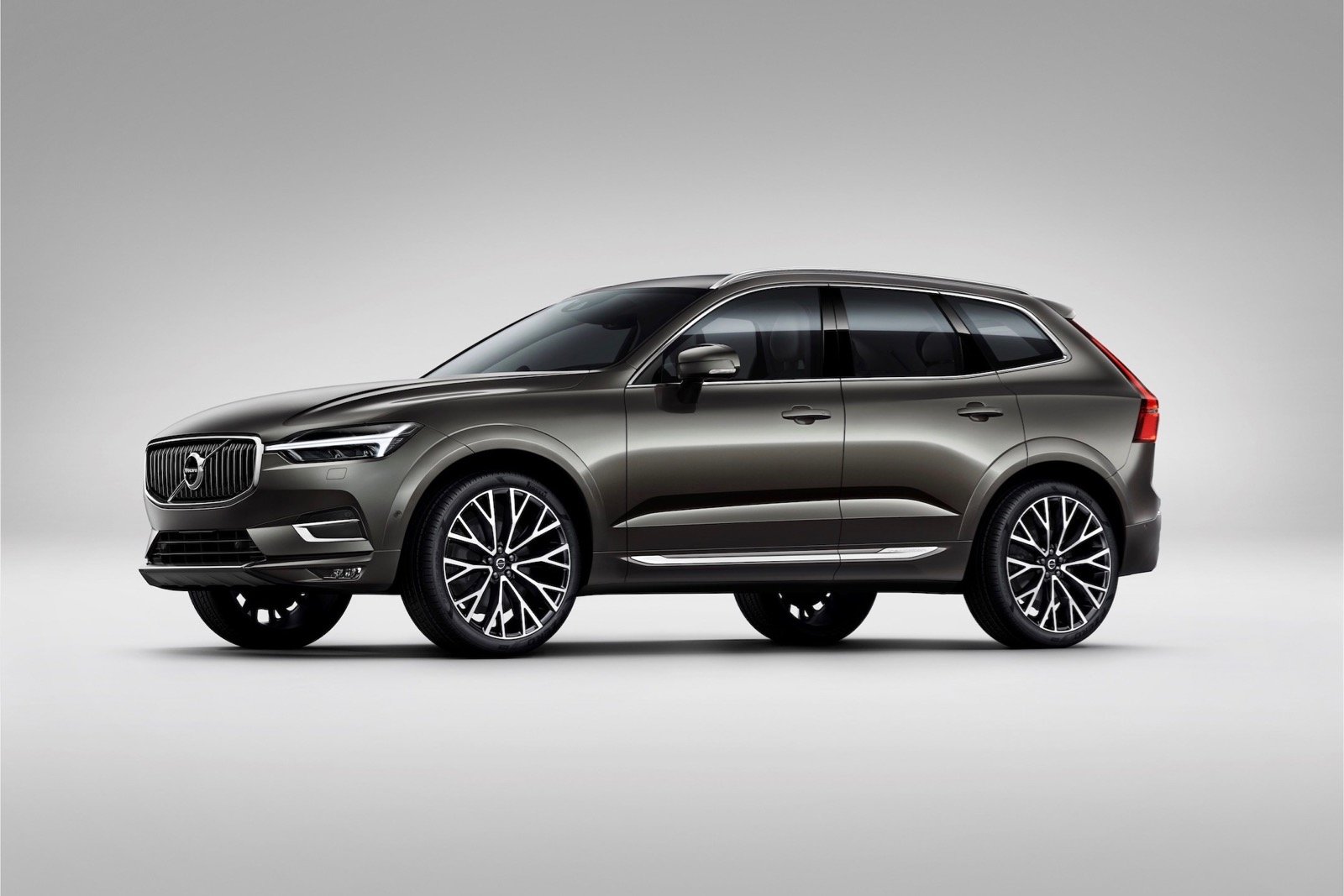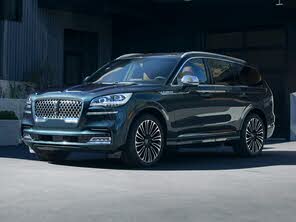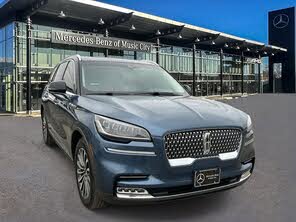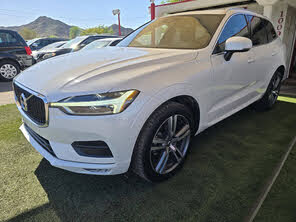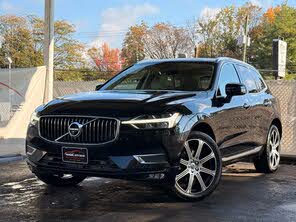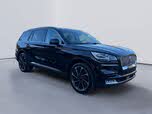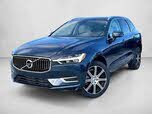2020 Lincoln Aviator vs 2021 Volvo XC60
Overview | |
MSRP$51,100 | MSRP$41,700 |
Listings581 | Listings290 |
Ratings & Reviews | |
User Reviews | User Reviews |
Expert reviews8.2 out of 10 | Expert reviews8.0 out of 10 |
Pros
Cons
| Pros
Cons
|
2020 Lincoln Aviator Reviews SummaryThe heyday for Lincoln was more than a half-century ago. Those postwar years of prosperity and optimism were the perfect time for cars like the Continental and others. They delivered comfort and luxury, wrapped in midcentury modern styling. Even as recently as the 1990s, Lincoln was still a popular brand, riding the SUV craze with its Navigator. But after the turn of the century, Lincoln lost its ability to create new designs and looked inward and backward. Sure, retro-themed cars like the redesigned Mustang, PT Cruiser, and Chevy HHR had turned some heads, but none of those came from luxury brands. The BMWs and Mercedes of the world were all looking forward and pushing the envelope for contemporary automotive design. Meanwhile, Lincoln offered the MKX, which was based on the Ford Edge and featured ’66 Continental styling. Neat in a vacuum, but off-base compared to the modern luxury market. This experimental phase with various retro looks coincided with the move to the MK-# alphabet-soup naming convention and big improvements in the Ford lineup, where top-end trims of the Fusion overlapped with an entry-level trim of the MKZ. The combination left Lincoln a confusing, anonymous afterthought in the modern luxury game. But Lincoln is finally ready to change all that. It has a new cohesive design language, its focus is once again on luxury, and the three-letter naming convention that never meant anything to anyone other than Lincoln marketers is gone. The brand led with the 2017 Continental and 2018 Navigator, which are each impressive in their own right. But the company's lineup is growing and now includes the all-new 2020 Lincoln Aviator. Named after a luxury variant of the 2002-2005 Ford Explorer, this new Aviator is also based on the contemporary Explorer platform, but it's a luxury vehicle in its own right. Much of the success of the Lincoln brand may hinge on this midsize, 3-row luxury SUV, so you need to consider its competition, such as the Audi Q7, Infiniti QX60, and all-new Cadillac XT6. Read on to learn if Lincoln’s take on luxury will stand out in a crowded competitive field. | |
2021 Volvo XC60 Reviews SummaryIn the middle of a very competent trio of crossover SUVs, the 2021 Volvo XC60 impresses with luxury-level appointments, cool Scandinavian style, exceptional safety features, and a lusty powertrain. Volvo makes a case for its inclusion in the premium vehicle class with the XC60, and it manages to squeeze value out of every drop of gas, too. | |
No video found | |
Popular Features & Specs | |
Engine3.0L 400 hp V6 | Engine2.0L 250 hp I4 |
Drive TrainRWD | Drive TrainFWD |
Seating Capacity7 | Seating Capacity5 |
Horsepower | Horsepower250 hp @ 5500 rpm |
MPG City18 | MPG City22 |
MPG Highway26 | MPG Highway29 |
Engine | |
Engine Name3.0L 400 hp V6 | Engine Name2.0L 250 hp I4 |
Torque | Torque258 lb-ft @ 1500 rpm |
Horsepower | Horsepower250 hp @ 5500 rpm |
DrivetrainRWD | DrivetrainFWD |
Fuel Economy | |
MPG City18 | MPG City22 |
MPG Highway26 | MPG Highway29 |
Interior | |
Leather Seats | Leather SeatsStandard |
Seating Capacity7 | Seating Capacity5 |
Key Features | |
Sunroof/Moonroof | Sunroof/MoonroofStandard |
Safety | |
Front Crash Overall5 | Front Crash Overall5 |
Side Crash Overall5 | Side Crash Overall5 |
Dimensions & Capacity | |
Cargo Space18.3 cu ft | Cargo Space37.8 cu ft |
Curb Weight4764 lbs | Curb Weight4008 lbs |
Height69.8 in | Height65.3 in |
Length199.3 in | Length184.6 in |
Width89.9 in | Width83.3 in |
Wheelbase119.1 in | Wheelbase112.8 in |
Maximum Payload | Maximum Payload950 lbs |
Number of doors4 | Number of doors4 |
Maximum Towing Capacity | Maximum Towing Capacity3500 lbs |
Overview | ||
MSRP | $51,100 | $41,700 |
Listings | ||
Ratings & Reviews | ||
User reviews | ||
Expert reviews | 8.2 out of 10Read full review | 8.0 out of 10Read full review |
Pros & cons | Pros
Cons
| Pros
Cons
|
Summary | The heyday for Lincoln was more than a half-century ago. Those postwar years of prosperity and optimism were the perfect time for cars like the Continental and others. They delivered comfort and luxury, wrapped in midcentury modern styling. Even as recently as the 1990s, Lincoln was still a popular brand, riding the SUV craze with its Navigator. But after the turn of the century, Lincoln lost its ability to create new designs and looked inward and backward. Sure, retro-themed cars like the redesigned Mustang, PT Cruiser, and Chevy HHR had turned some heads, but none of those came from luxury brands. The BMWs and Mercedes of the world were all looking forward and pushing the envelope for contemporary automotive design. Meanwhile, Lincoln offered the MKX, which was based on the Ford Edge and featured ’66 Continental styling. Neat in a vacuum, but off-base compared to the modern luxury market. This experimental phase with various retro looks coincided with the move to the MK-# alphabet-soup naming convention and big improvements in the Ford lineup, where top-end trims of the Fusion overlapped with an entry-level trim of the MKZ. The combination left Lincoln a confusing, anonymous afterthought in the modern luxury game. But Lincoln is finally ready to change all that. It has a new cohesive design language, its focus is once again on luxury, and the three-letter naming convention that never meant anything to anyone other than Lincoln marketers is gone. The brand led with the 2017 Continental and 2018 Navigator, which are each impressive in their own right. But the company's lineup is growing and now includes the all-new 2020 Lincoln Aviator. Named after a luxury variant of the 2002-2005 Ford Explorer, this new Aviator is also based on the contemporary Explorer platform, but it's a luxury vehicle in its own right. Much of the success of the Lincoln brand may hinge on this midsize, 3-row luxury SUV, so you need to consider its competition, such as the Audi Q7, Infiniti QX60, and all-new Cadillac XT6. Read on to learn if Lincoln’s take on luxury will stand out in a crowded competitive field. | In the middle of a very competent trio of crossover SUVs, the 2021 Volvo XC60 impresses with luxury-level appointments, cool Scandinavian style, exceptional safety features, and a lusty powertrain. Volvo makes a case for its inclusion in the premium vehicle class with the XC60, and it manages to squeeze value out of every drop of gas, too. |
Video | No video found | |
Popular Features & Specs | ||
Engine | 3.0L 400 hp V6 | 2.0L 250 hp I4 |
Drive Train | RWD | FWD |
Seating Capacity | 7 | 5 |
Horsepower | 250 hp @ 5500 rpm | |
MPG City | 18 | 22 |
MPG Highway | 26 | 29 |
Engine | ||
Engine Name | 3.0L 400 hp V6 | 2.0L 250 hp I4 |
Torque | 258 lb-ft @ 1500 rpm | |
Horsepower | 250 hp @ 5500 rpm | |
Drivetrain | RWD | FWD |
Fuel Economy | ||
MPG City | 18 | 22 |
MPG Highway | 26 | 29 |
Interior | ||
Leather Seats | Standard | |
Seating Capacity | 7 | 5 |
Key Features | ||
Sunroof/Moonroof | Standard | |
Safety | ||
Front Crash Overall | 5 | 5 |
Side Crash Overall | 5 | 5 |
Dimensions & Capacity | ||
Cargo Space | 18.3 cu ft | 37.8 cu ft |
Curb Weight | 4764 lbs | 4008 lbs |
Height | 69.8 in | 65.3 in |
Length | 199.3 in | 184.6 in |
Width | 89.9 in | 83.3 in |
Wheelbase | 119.1 in | 112.8 in |
Maximum Payload | 950 lbs | |
Number of doors | 4 | 4 |
Maximum Towing Capacity | 3500 lbs | |
The 2020 Lincoln Aviator was positioned between the Navigator and the compact MKC (later replaced by the Corsair) in Lincoln's lineup. It marked a return to real vehicle names, moving away from the old alphabet-soup naming convention. The Aviator featured a unified design language across Lincoln's sedans, crossovers, and SUVs, with handsome headlights and an upright chrome grille. Its roofline tapered slightly, giving it an elongated look, while the low, wide beltline added a boat-like appearance. Inside, the Aviator's cabin boasted a flowing design with soft-touch materials and selective use of brightwork. The seats were both elegant and sturdy, with shifter buttons resembling piano keys. The front seats were incredibly comfortable, using plush leather throughout, even in areas where it wasn't necessary, indicating a deep commitment to luxury. The Aviator also had unique touches like a massive panoramic moonroof and warning jingles recorded by the Detroit Symphony Orchestra.
The 2021 Volvo XC60, positioned between the compact XC40 and the larger XC90, was built on Volvo's SPA (Scalable Product Architecture) platform. The XC60 shared a common look with other Volvo crossovers, featuring an elegant, tailored two-box design with short front and rear overhangs. The body sides were tucked in athletically, with crisp details emphasizing an agile form. The upright grille proudly displayed Volvo's iron mark logo, and the front headlights featured an LED daytime running light in the shape of Thor's hammer. Inside, the XC60's cabin was defined by clean lines, authentic materials, and a serene aura. The 9-inch portrait-oriented infotainment touchscreen was easier to accept by 2021, and the little details, like the elegant HVAC vents, elevated the XC60 to near-luxury status. The textures and colors throughout the cabin were harmonious and rewarding, making it a very nice place to spend time.











The 2020 Lincoln Aviator came standard with a twin-turbocharged 3.0-liter V6 engine, producing 400 horsepower and 415 pound-feet of torque. The Grand Touring trim combined this engine with a 100-hp electric motor, resulting in a net 494 hp and 630 lb-ft of torque. Both powertrains used a 10-speed automatic transmission, with the base V6 offering rear-wheel drive (RWD) or all-wheel drive (AWD), while the plug-in hybrid (PHEV) was AWD only. Both versions could accelerate from 0-60 mph in about 4 seconds. The Grand Touring's hybrid setup provided hushed, confident acceleration and smoothed out the driving experience. The Aviator's steering was light, and its brakes were cushioned in their feedback. The Excite drive mode offered a bit more dynamic driving, but the Aviator's 5,600-pound weight limited its sportiness. Fuel economy for the RWD Aviator was 18 mpg city, 26 highway, 21 combined, while the AWD version achieved 17 mpg city, 24 highway, 20 combined. The PHEV had a combined 23 mpg, with a 21-mile electric-only range and a 56 MPGe combined rating.
The 2021 Volvo XC60 used a 2.0-liter four-cylinder gasoline engine and an eight-speed automatic transmission. T5 models produced 250 horsepower and 258 pound-feet of torque, while T6 models generated 316 hp and 295 lb-ft of torque. The T8 models, which were plug-in hybrids, added an 87-hp electric motor, bringing the total output to 400 hp and 472 lb-ft of torque. The T8 Polestar Engineered model increased the combined output to 415 hp and 472 lb-ft of torque. The T8 models could drive up to 19 miles on electric power alone. The XC60's AWD system and torque vectoring allowed it to glide around corners effortlessly, and the cabin was serenely quiet with a smooth suspension. Fuel economy ranged from 22 mpg city/29 mpg highway/25 mpg combined for the T5 FWD to 27 mpg combined for the T8 PHEV and 57 MPGe combined in electric-only mode. Premium gasoline was recommended for all XC60 models.
The 2020 Lincoln Aviator, with its three rows of seats, competed with vehicles like the Audi Q7, Infiniti QX60, Mercedes-Benz GLE, Land Rover Discovery, and Cadillac XT6. The optional second-row captain's chairs were fantastic, while the power-closing third row was adequate for adults but best suited for kids on longer trips. With the second and third rows folded, the Aviator offered 77 cubic feet of cargo space, comparable to the Cadillac XT6. However, the Aviator's controls could be confusing, with overly complicated seat adjustments and unconventional door-release functions. The 30-way seats with a massage function were worth the effort to learn, but the door-release mechanism was unnecessarily complicated, raising concerns about usability in emergencies.
The 2021 Volvo XC60 was designed to provide comfort, style, and safety. The front seats were highly adjustable and heated, making them ideal for winter conditions. The heating system, rear glass heater, windshield defroster, washer, and wipers performed exceptionally well in sub-freezing temperatures. The XC60's cabin featured smart storage solutions in the center console, dashboard, and door panels. The second row had secure storage in the seatbacks, lower center console, door panels, and center armrest. The controls were intuitive and glove-friendly, reflecting Swedish winter expertise. The XC60 offered 21.6 cubic feet of cargo space behind the rear seats and up to 63.6 cubic feet with the rear seats folded. Each XC60 model could tow up to 3,500 pounds.
The 2020 Lincoln Aviator featured the Sync 3 infotainment system with a 10.1-inch touchscreen in a landscape layout. This setup provided a user-friendly interface for Apple CarPlay and Android Auto, with large icons and readouts. The Aviator also had a fully digital instrument panel and a massive head-up display, which presented information in a minimalist and unobtrusive manner.
The 2021 Volvo XC60 used the Sensus infotainment system, which had a tablet-style touchpad interface. The system's portrait orientation and function quadrants made it intuitive for frequent iPad users, but there was a learning curve. Smartphone integration included Bluetooth, Apple CarPlay, Android Auto, and a WiFi hotspot with a three-month trial. The Volvo On Call app added vehicle-specific functionality, such as maintenance reminders and remote locking. The Bowers & Wilkins premium audio system in the test XC60 was exceptional.
The 2020 Lincoln Aviator came with standard safety features, including front and side-impact airbags, traction control, and a tire pressure monitoring system. The Lincoln Co-Pilot360 suite included forward-collision avoidance, lane-departure warning, adaptive cruise control, automatic high beams, blind-spot monitoring, and a head-up display.
The 2021 Volvo XC60 benefited from Volvo's long-standing commitment to safety. It received a Top Safety Pick+ rating from the IIHS and five-star ratings from the NHTSA for the T5/T5 AWD and T6 AWD models. Standard safety features included LED headlights, blind-spot monitoring, rear cross-traffic alert, collision avoidance, low- and high-speed collision mitigation, vehicle/cyclist/large animal detection, driver alert control, run-off road protection, lane-departure warning, lane-keeping aid, front, side, and curtain airbags, whiplash protection, slippery road/hazard light alert, rear park assist camera, power child locks, and care key. The semi-autonomous Pilot Assist system was available, integrating adaptive cruise control and lane-keeping assist. The XC60's top speed was restricted to 112 mph for safety.
CarGurus highlights
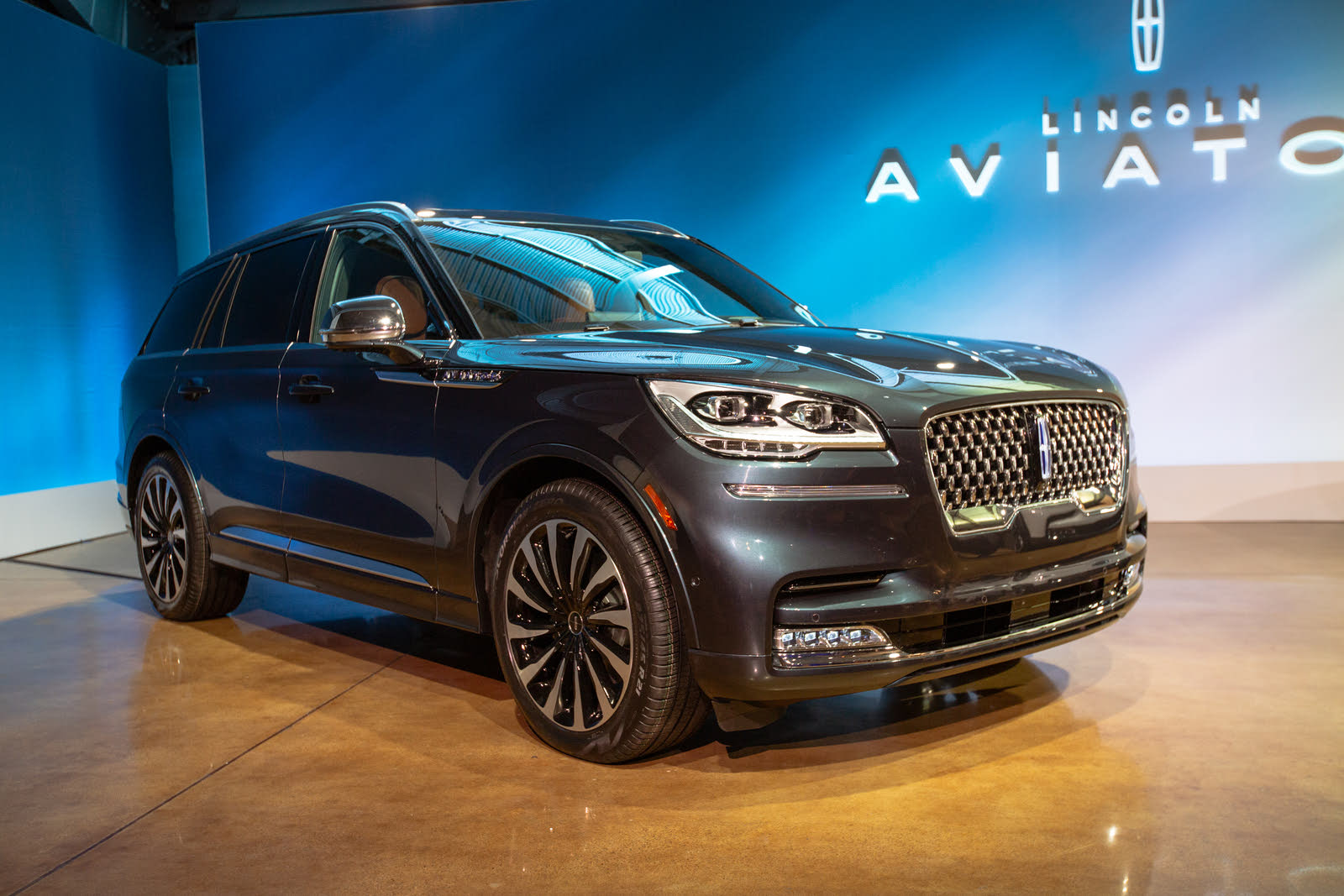
According to CarGurus experts, the overall rating for the 2020 Lincoln Aviator is 8.2 out of 10, while the 2021 Volvo XC60 scores 8.0 out of 10. Based on these ratings, the 2020 Lincoln Aviator is the recommended choice, offering a slightly higher overall rating and a blend of luxury, performance, and unique features.
Choose the 2020 Lincoln Aviator if:
- You prioritize a powerful engine with a smooth hybrid option.
- You value luxurious interior touches and unique features like orchestral warning jingles.
- You need a three-row SUV with ample cargo space.
Choose the 2021 Volvo XC60 if:
- You want a vehicle with a strong commitment to safety and top safety ratings.
- You appreciate Scandinavian design and a serene, well-crafted interior.
- You prefer a plug-in hybrid option with excellent fuel economy and electric-only driving capability.
CarGurus highlights

According to CarGurus experts, the overall rating for the 2020 Lincoln Aviator is 8.2 out of 10, while the 2021 Volvo XC60 scores 8.0 out of 10. Based on these ratings, the 2020 Lincoln Aviator is the recommended choice, offering a slightly higher overall rating and a blend of luxury, performance, and unique features.
Choose the 2020 Lincoln Aviator if:
Shop Now- You prioritize a powerful engine with a smooth hybrid option.
- You value luxurious interior touches and unique features like orchestral warning jingles.
- You need a three-row SUV with ample cargo space.
Choose the 2021 Volvo XC60 if:
Shop Now- You want a vehicle with a strong commitment to safety and top safety ratings.
- You appreciate Scandinavian design and a serene, well-crafted interior.
- You prefer a plug-in hybrid option with excellent fuel economy and electric-only driving capability.

By: CarGurus + AI
At CarGurus, our team of experienced automotive writers remain at the heart of our content operation, conducting hands-on car tests and writing insightful guides that are backed by years of industry experience. To complement this, we are harnessing AI to make our content offering more diverse and more helpful to shoppers than ever. To achieve this, our AI systems are based exclusively on CarGurus content, ratings and data, so that what we produce is both unique to CarGurus, and uniquely helpful to car shoppers.
